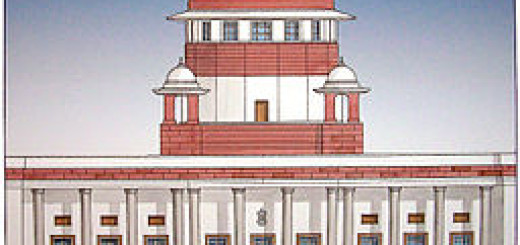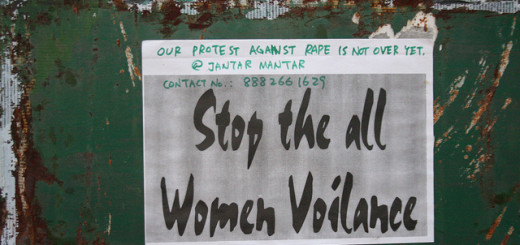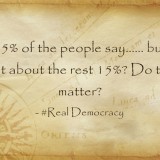Homosexuality in India : Naturally Unnatural
Written by Anurag Dwivedi for Techkriti Blog for a Cause Contest
The Section 377 of IPC has been the cause of many furors over the years. It states the following:
Unnatural offences —Whoever voluntarily has carnal intercourse against the order of nature with any man, woman or animal, shall be punished with imprisonment for life, or with imprisonment of either description for a term which may extend to ten years, and shall also be liable to fine.
While some have claimed this section to be arbitrary and ambiguous others have called it downright unconstitutional. Much has been said and written about the violation of Fundamental Rights in Articles 14, 15 and 21 of the Indian Constitution caused by this law. I would like to explore the issue of labeling homosexuality in India as unnatural.
The fundamental question of this ongoing debate is what defines and what defies “the order of nature”. The religious pundits are quick to label homosexuality as unnatural on the basis of religious and cultural beliefs. These beliefs are accepted by majority of the population but disagreements do exist. The differences are often ignored if not oppressed. Hence, it would be fallacious to believe that such viewpoints would be correct on all issues especially if the issue concerns a disagreeing minority population. Therefore, to assay the veracity of this law, neutral perspective provided by medical science becomes essential. In 1973, the American Psychiatric Association removed homosexuality from the Diagnostic and Statistical Manual of Mental Disorders citing the reason that homosexual feelings and behaviors are variations of human sexuality but a normal and positive one. Since then, many health organizations have followed suit. The Indian Psychiatric Society has also stated that homosexuality is not a mental illness or disease. Furthermore, as of 2012, about 3.8% of the American population identify themselves with the LGBT community. Could it happen that such a substantial segment of American population have developed an anomaly, a mental illness? It is for us to decide which position to take. The one based on subjective opinions of the masses or which is backed by empirical science.
The cultural and temporal aspect of this law is equally important. Formulated in 1861, this archaic law belongs to Victorian England. It was an era when people were fighting against gender, race, class and religion prejudices. Much has changed since then. But, when it comes to homosexuality, we are still hung up in the 19th century. When the founders of Indian Democracy wrote the Indian Constitution, they included the provision of amendments because they believed that opinions change over time. Then, why do we want to hold on to an old law so vehemently? Many countries of the world including United Kingdom have abolished laws criminalizing homosexuality. It is only natural that India should break free from the curbs of old colonial laws and join the ranks of progressive countries. But, by criminalizing homosexuality India now stands together with most Muslim-majority and sub-Saharan African countries on this issue. It is not a natural place for a country that has welcomed everyone with open hands, is tolerant and inclusive of various cultures and is celebrated worldwide for its “unity in diversity”. Vikram Seth, notable Indian novelist and poet aptly puts it when he says, “What is un-Indian about this law is the intolerance shown in this regard.”
Why do I still consider homosexuality naturally unnatural in Indian context? The answer lies within us. Though the Indian Constitution in principle fosters inclusiveness and tolerance, as individuals, we are still very far away from practising it. We are not open to new ideas as readily as we would want to. The past president of Indian Psychiatric Society (IPS), Dr Indira Sharma, in a remark which was refuted by IPS said, “The manner in which homosexuals have brought the talk of sex to the roads makes people uncomfortable. It’s unnatural. Our society doesn’t talk about sex. Heterosexuals don’t talk about sex. It is a private matter.” Her opinion resonates perfectly with the views prevalent in today’s society. Sex is a taboo in this society. It is a word that provokes immature giggles from teenagers and frowns from the elderly. If sex is considered a social stigma, homosexuality takes this abhorrence to an entirely different level. Such are the sentiments attached to homosexuality that even the Supreme Court chokes up and refuses to even take cognizance of the matter. Why? Because LGBT people challenge the very notions of sexuality and gender that people had considered established and undisputed for centuries. Even though people may support the cause of homosexuality and even sympathize with the discriminated people, they would not like to have a LGBT person in their family. They are naturally inclined against homosexuality. This homophobia often takes the form of hypocrisy. A woman can be married against her wishes and forcefully subjected to conjugal sex. The law will not criminalize marital rape but criminalizes private consensual sex among adults if they happen to be of the same gender.
Even though majority of this country is insensitive to this issue, law can’t be made according to their whims and fancies. The SC as a counter majoritarian institution must strive to deliver justice to all segments of the society. The SC claimed that it’s not in its purview to repeal Article 377 of IPC and is a matter to be decided by the Legislature. In this country, policies are tabulated in the Parliament only for the appeasement of certain factions of the society and for political gains. Hence, with no immediate electoral advantage, the amendment of Article 377 seems very unlikely in the nearby future. In the end it only leaves me wishing that the SC would have delivered a judicial judgment instead of a moral one and upheld the High Court’s verdict. For me, judiciary interfering in private consensual act behind closed doors is unnatural. Law telling us whom to love and spend our life with is unnatural. Homosexuality is not unnatural.









